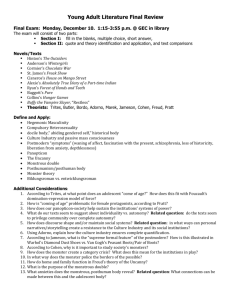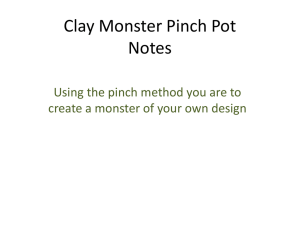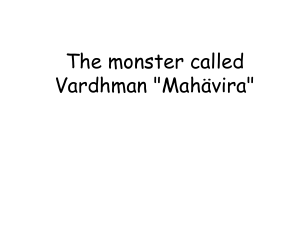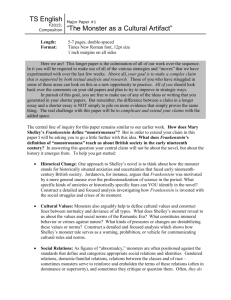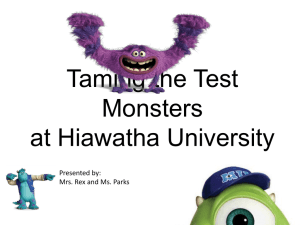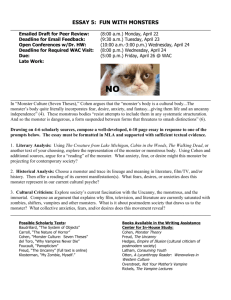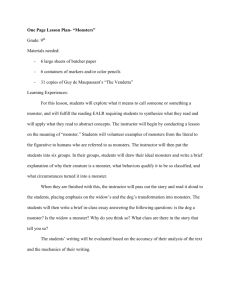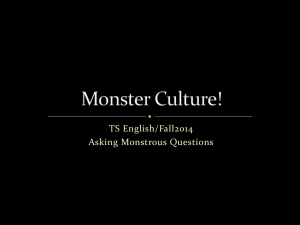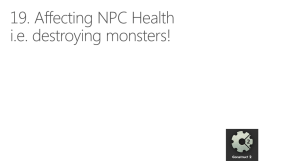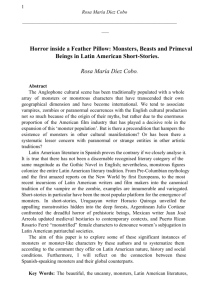File
advertisement
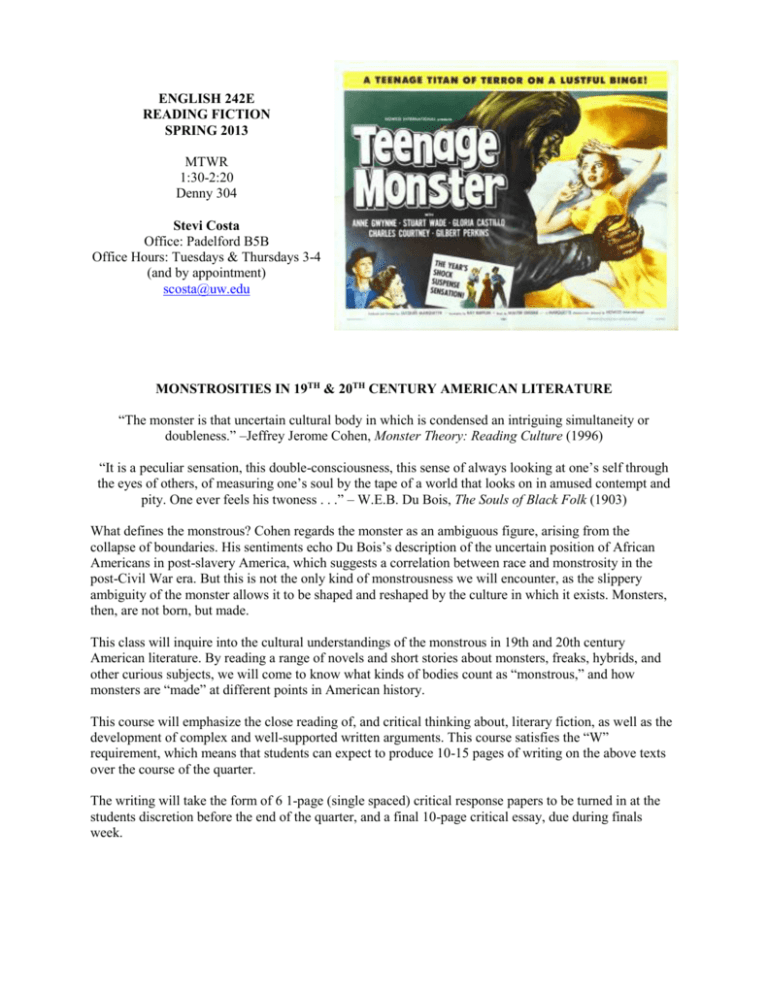
ENGLISH 242E READING FICTION SPRING 2013 MTWR 1:30-2:20 Denny 304 Stevi Costa Office: Padelford B5B Office Hours: Tuesdays & Thursdays 3-4 (and by appointment) scosta@uw.edu MONSTROSITIES IN 19TH & 20TH CENTURY AMERICAN LITERATURE “The monster is that uncertain cultural body in which is condensed an intriguing simultaneity or doubleness.” –Jeffrey Jerome Cohen, Monster Theory: Reading Culture (1996) “It is a peculiar sensation, this double-consciousness, this sense of always looking at one’s self through the eyes of others, of measuring one’s soul by the tape of a world that looks on in amused contempt and pity. One ever feels his twoness . . .” – W.E.B. Du Bois, The Souls of Black Folk (1903) What defines the monstrous? Cohen regards the monster as an ambiguous figure, arising from the collapse of boundaries. His sentiments echo Du Bois’s description of the uncertain position of African Americans in post-slavery America, which suggests a correlation between race and monstrosity in the post-Civil War era. But this is not the only kind of monstrousness we will encounter, as the slippery ambiguity of the monster allows it to be shaped and reshaped by the culture in which it exists. Monsters, then, are not born, but made. This class will inquire into the cultural understandings of the monstrous in 19th and 20th century American literature. By reading a range of novels and short stories about monsters, freaks, hybrids, and other curious subjects, we will come to know what kinds of bodies count as “monstrous,” and how monsters are “made” at different points in American history. This course will emphasize the close reading of, and critical thinking about, literary fiction, as well as the development of complex and well-supported written arguments. This course satisfies the “W” requirement, which means that students can expect to produce 10-15 pages of writing on the above texts over the course of the quarter. The writing will take the form of 6 1-page (single spaced) critical response papers to be turned in at the students discretion before the end of the quarter, and a final 10-page critical essay, due during finals week. REQUIRED TEXTS Crane, Stephen. The Monster and Other Stories. (ISBN: 978-1479179329) Anderson, Sherwood. Winesburg, Ohio. (ISBN: 978-0486282695) Dunn, Katherine. Geek Love. (ISBN: 978-0375713347) Jackson, Shelley. Half Life. (ISBN: 978-0060882365) Electronic Coursepack, available on the course website (containing all other materials in the schedule of readings not listed above) GRADING BREAKDOWN AND DUE DATES Critical Response Papers: 30% Students are responsible for writing, at their own discretion, 6 1-page (single spaced) critical response papers throughout the quarter. Critical response papers don’t need to have an argument, but they should demonstrate that you’ve done some thinking about the text you’ve chosen to respond to before class. This could be done by close reading a passage you find interesting, exploring the applications and implications of any of the critical essays we read, or thinking about the literary texts in relation to the critical essays. You will get feedback from me on each of your critical response papers, with the hope that you will find one of them a useful jumping off point for further exploration in your final paper. Final Paper: 40% Students will develop a final paper that incorporates literature and criticism into a substantial argument. These papers will be no shorter than 10 pages (double spaced). Due date TBA. Discussion and Participation: 30% Participation is determined by your ability to keep up with the readings, attention and engagement in the class, speaking and listening in discussion, reading quizzes, and one short (5-10 minute) presentation during the quarter. COURSE POLICIES LATE WORK________________________________________________________________________ Response papers are to be submitted in class on the date we are set to discuss the text about which you’ve chosen to write. They are meant not only to be starting points for thinking about your final papers, but also ways to facilitate class discussion. Having them with you in class on the day you plan to hand one in is beneficial to everyone. If, due to some extenuating circumstances (see: medical emergency, family emergency), you are unable to submit a hardcopy of a response paper in class on the appropriate date, please email me and we can discuss your options. I am willing to work with students who speak to me in advance about any issues they might have meeting deadlines. The final paper will be due in hardcopy during finals week at a date and time TBA. Any late work will be marked down .10 from the final grade for each day that it is late. (So, if you write a 3.7 paper, but you turned it in 2 days late, you can only earn a 3.5 on that paper.) The best way to avoid this penalty is to submit your work on time. That said, if you feel you will have trouble meeting deadlines for any reason, please email me and we will discuss your options. I’m always more lenient about deadline issues if I know about them in advance. SUBMISSION GUIDELINES Minimum and maximum length guidelines need to be respected, so please do not write too much, and definitely don’t write too little. (This means that when I ask you for a 10 page minimum, I’d like to see your text go all the way to the bottom of the 10th page.) I will return for resubmission papers that are much too short, and they will be considered late and incur the above stated penalty when resubmitted. All assignments should be typed according to MLA (Modern Language Association) guidelines. This includes (but is not limited to): 12 pt. Times New Roman font Standard margins (1” – this setting is called “Normal” in Microsoft Word) Double-spaced (except for Response Papers!) Last name and page numbers in the header of every page (except page 1) MLA style citation/Works Cited page If you feel unsure about what any of this means, or if you have any other concerns, consult the online style guide at the Purdue OWL website (http://owl.english.purdue.edu/) and/or come talk to me. ACCOMMODATIONS If you need accommodation of any sort, please let me know so that I can work with the UW Disability Resources for Students (DRS) to provide what you require. This syllabus is available in large print, as are other class materials. More information about accommodation may be found at http://www.washington.edu/students/drs/. WRITING RESOURCES There are two particularly fantastic writing resources for you here on campus at UW. Both are free of charge, and I would very strongly encourage you to take advantage of these resources. The Odegaard Writing and Research Center allows you to schedule 45-minute tutoring sessions in which to talk about your writing or specific writing assignments for any class. You may book these on-line at: http://depts.washington.edu/owrc/ (and I would suggest booking early, as they tend to fill up quickly!) The CLUE Writing Center is located in Mary Gates Hall, and offers late-night drop-in tutoring. You can get all the details here: http://depts.washington.edu/clue/dropintutor_writing.php PLAGIARISM Plagiarism, or academic dishonesty, is presenting someone else's ideas or writing as your own. In your writing for this class, you are encouraged to refer to other people's thoughts and writing--as long as you cite them. As a matter of policy, any student found to have plagiarized any piece of writing in this class will be immediately reported to the College of Arts and Sciences for review. STUDENT RESPONSIBILITIES Please come to class prepared to participate in the activities for the day. This means: having read the materials and being ready to discuss them, asking questions, listening attentively to your peers when they speak, taking notes, and following along in your texts. Class/Group Discussions: The more you engage in this academic community, the more you will learn. As with class attendance, it is important for you to participate in class and/or group discussions as thoroughly as possible; we want our time to be productive. That said, I’d like our classroom space to feel safe and comfortable for everyone to have their voice heard. If speaking up is hard for you, try to participate by asking questions of your classmates or pointing out passages in the text that support others’ ideas. Conversely, if you feel very comfortable talking, try to step back and give others the space to explore. Respect is paramount. We’re all allowed to disagree and have divergent thoughts and opinions, but we must do so in a respectful manner. Technology: My classroom welcomes the use of assistive technologies to aide student learning. If you prefer to use a Kindle or other e-reader for your texts, go for it. If a PDF on a laptop works for you, great. If you take notes better by typing than writing manually, fantastic. Just be aware that you are only to use your assistive technologies for the purposes of accessing texts and note taking – no Facebook, no email, no general Internet surfing during class, please. Likewise, you are expected to put your cell phone away and set it to “silent.” And don’t text during class. Missed Classes: You are responsible for all information announced in class. If you miss a class, you need to find out what you’ve missed either by asking a classmate or emailing me. Cancellations: In the unlikely event that I would ever have to cancel a class, I would let you know as soon as possible by e-mail, generally by 7:00am the day of class. SCHEDULE OF READINGS 4/1: NO CLASS 4/2: Syllabus 4/3: Introduction to Monster Theory (Jeffrey Jerome Cohen) 4/4: tba 4/8: selections from P.T. Barnum’s autobiography 4/9: “Blind Tom” (Rebecca Harding Davis) 4/10: “The Personal Habits of Siamese Twins” (Mark Twain) 4/11: selections from The Souls of Black Folk (W.E.B DuBois) 4/15: “Monstrosity” from The Material Unconscious (Bill Brown) 4/16: The Monster (Stephen Crane) 4/17: The Monster (Stephen Crane) 4/18: “Cruel and Unusual Light” (Jordan Naito) 4/22: “Preface and Casting Out the Outcast: Naturalism and the Brute” (June Howard) 4/23: selections from “Criminal Man” (Cesare Lombrosco) 4/24: “Man Proposes”, selections from McTeague (Frank Norris) 4/25: selections from Vandover and The Brute (Frank Norris) 4/29: “Formation, Deformation & Reformation: An Introduction to the Grotesque” (Geoffrey Galt Harpham) 4/30: Winesburg, Ohio (Sherwood Anderson) 5/1: Winesburg, Ohio (Sherwood Anderson) 5/2: “Introduction” from Rabelais and His World (Mikhail Bakhtin) 5/6: “Desiree’s Baby” (Kate Chopin) 5/7: “Mothers, Monsters, and Machines” (Rosi Braidotti) 5/8: “That Only a Mother” (Judith Merrill) 5/9: “Best Practical Means of Cutting off Defective Germ Plasm in the American Population” (Cold Spring Harbor Report) 5/13: “The Cyborg Manifesto” (Donna Haraway) 5/14: The Girl Who Was Plugged In (James Tiptree, Jr./Alice Sheldon) 5/15: “Burning Chrome” (William Gibson) 5/16: “The Legacies of Cyberpunk Fiction: New Cultural Formations and the Emergence of the Posthuman” from Souls of Cyberfolk: Posthumanism as Vernacular Theory (Thomas Foster) 5/20: Geek Love [read up to Ch. 6 (page 64)] 5/21: Geek Love [read up to Ch. 11 (page 124)] 5/22: Geek Love [read up to Ch. 18 (page 208)] 5/23: Geek Love [read up to Ch. 21 (page 257)] 5/27: NO CLASS – Memorial Day 5/28: Geek Love [finish book] 5/29: Half-Life [read up to page 72] 5/30: Half-Life [read up to page 146] 6/3: Half-Life [read up to page 236] 6/4: Half-Life [read up to page 305] 6/5: Half-Life [read up to page 381] 6/6: Half-Life [finish book]
